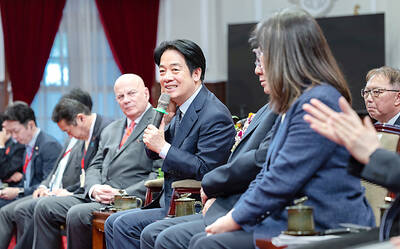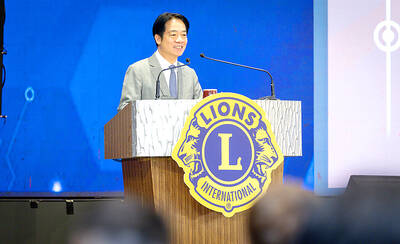The nation’s economy will continue to grow at a slow, but steady pace of between 2 and 2.6 percent this year, major economic think tanks have forecast.
The nation’s economic performance last year was better than expected, helped by steady global growth and rising raw material prices, the Directorate-General of Budget, Accounting and Statistics (DGBAS) said.
GDP growth in the first three quarters of last year was 2.66 percent, 2.13 percent and 3.11 percent, respectively, and the nation’s exports hit a record US$28.88 billion in November, up 14 percent from a year earlier.
November’s export figures marked the 14th consecutive month of growth in outbound sales on an annual basis, according to the tallies compiled by the Ministry of Finance.
The ministry said it expects the growth trend to continue this year.
The nation’s economic growth should stay above 2 percent this year, major economic think tanks said.
Academia Sinica was the most optimistic, forecasting GDP growth of 2.43 percent for this year, compared with 2.31 percent forecast by the Taiwan Research Institute and 2.3 percent forecast by the Taiwan Institute of Economic Research.
Other predictions were 2.29 percent by the DGBAS, 2.27 percent by the Chung-Hua Institution for Economic Research (中華經濟研究院) and 2.2 percent by the Yuanta-Polaris Research Institute.
However, none of the projections exceeded this year’s growth rate, which the DGBAS estimated in November at 2.58 percent.
Academia Sinica attributed its lower forecast to a relatively high comparison base last year, even while expecting the economy to continue its recovery this year on the back of surging global demand and a steady increase in raw material prices.
UNCERTAINTIES
There are still uncertainties that could negatively affect the nation’s economy this year, Academia Sinica’s Institute of Economics director Kamhon Kan (簡錦漢) said.
They include a potential trade war between the US and China, a US tax reform bill and the US Federal Reserve’s plan to downsize its balance sheet, which could put pressure on the bond market and cause interest rates to rise, Kan said.
Developments in cross-strait relations and the government’s economic policies would also affect the economy, Yuanta-Polaris president Liang Kuo-yuan (梁國源) said.

Two US House of Representatives committees yesterday condemned China’s attempt to orchestrate a crash involving Vice President Hsiao Bi-khim’s (蕭美琴) car when she visited the Czech Republic last year as vice president-elect. Czech local media in March last year reported that a Chinese diplomat had run a red light while following Hsiao’s car from the airport, and Czech intelligence last week told local media that Chinese diplomats and agents had also planned to stage a demonstrative car collision. Hsiao on Saturday shared a Reuters news report on the incident through her account on social media platform X and wrote: “I

‘BUILDING PARTNERSHIPS’: The US military’s aim is to continue to make any potential Chinese invasion more difficult than it already is, US General Ronald Clark said The likelihood of China invading Taiwan without contest is “very, very small” because the Taiwan Strait is under constant surveillance by multiple countries, a US general has said. General Ronald Clark, commanding officer of US Army Pacific (USARPAC), the US Army’s largest service component command, made the remarks during a dialogue hosted on Friday by Washington-based think tank the Center for Strategic and International Studies. Asked by the event host what the Chinese military has learned from its US counterpart over the years, Clark said that the first lesson is that the skill and will of US service members are “unmatched.” The second

STANDING TOGETHER: Amid China’s increasingly aggressive activities, nations must join forces in detecting and dealing with incursions, a Taiwanese official said Two senior Philippine officials and one former official yesterday attended the Taiwan International Ocean Forum in Taipei, the first high-level visit since the Philippines in April lifted a ban on such travel to Taiwan. The Ocean Affairs Council hosted the two-day event at the National Taiwan University Hospital International Convention Center. Philippine Navy spokesman Rear Admiral Roy Vincent Trinidad, Coast Guard spokesman Grand Commodore Jay Tarriela and former Philippine Presidential Communications Office assistant secretary Michel del Rosario participated in the forum. More than 100 officials, experts and entrepreneurs from 15 nations participated in the forum, which included discussions on countering China’s hybrid warfare

MORE DEMOCRACY: The only solution to Taiwan’s current democratic issues involves more democracy, including Constitutional Court rulings and citizens exercising their civil rights , Lai said The People’s Republic of China (PRC) is not the “motherland” of the Republic of China (ROC) and has never owned Taiwan, President William Lai (賴清德) said yesterday. The speech was the third in a series of 10 that Lai is scheduled to deliver across Taiwan. Taiwan is facing external threats from China, Lai said at a Lions Clubs International banquet in Hsinchu. For example, on June 21 the army detected 12 Chinese aircraft, eight of which entered Taiwanese waters, as well as six Chinese warships that remained in the waters around Taiwan, he said. Beyond military and political intimidation, Taiwan